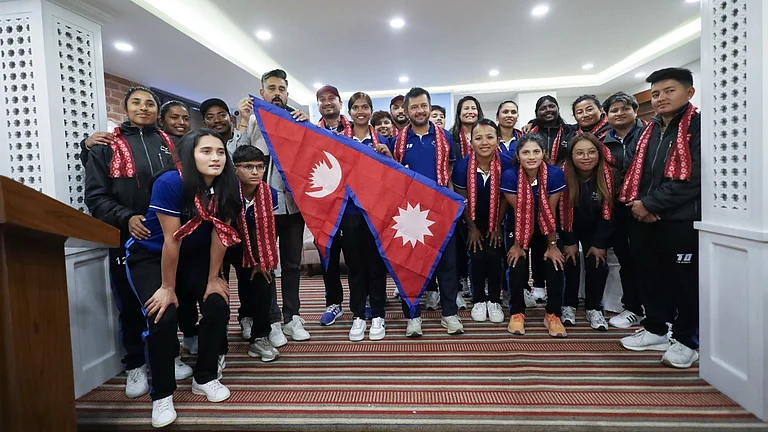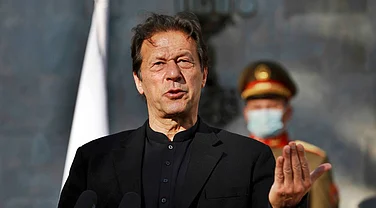In the latest attack in Pakistan, militants of Tehrik-i-Taliban Pakistan (TTP) on Friday attacked the Karachi police chief's office and killed four people.
The four deceased included two policemen, one Rangers official, and a citizen, according to The Dawn newspaper. Three TTP terrorists were also killed.
The TTP claimed responsibility for the attack that comes within weeks of a bombing in Pakistan's Peshawar killed over 100 and injured 200.
The TTP was until a few months back in negotiations with the Pakistani government, but then it walked out of the talks and announced an offensive against the Pakistani state. Over 100 have been killed in the attacks since.
What we know of the Karachi attack?
Heavily-armed TTP militants on Friday stormed the Karachi Police chief's office. The attack took place around 7:10 pm local time.
A spokesperson of the Karachi Police confirmed in a statement that the Karachi police chief’s head office had come under attack.
Karachi Police chief Javed Odho also confirmed in a tweet that his office was under attack but said the security forces had responded strongly.
Law enforcement agencies cleared the five-story office of the city's police chief after nearly a four-hour operation.
Sindh government spokesperson Murtaza Wahab said in a tweet from his official handle that the building has been cleared.
"Three terrorists have been neutralised," he said.
Besides the four dead, 14 persons —including Rangers personnel— were injured in the attack.
Police sources earlier said there were eight militants in the building.
DIG South Irfan Baloch said, "Some of the militants entered via the backside of the building while two entered from the main gate wearing police uniforms. We have also found two cars with their doors open one at the back entrance of the building and one at the front in which the terrorists came around 7.10 today."
Baloch said the bomb disposal squad had combed both cars for explosive devices and also the suicide vests of the terrorists.
He said, "They came prepared for a standoff and had sophisticated weapons and explosives."
TTP militants blew themselves: Police
A senior police official said that during the heavy exchange of firing two terrorists blew themselves up when cornered on the roof of the building.
He said, "But the identification process is still going on and it will take some time before we can say exactly how many terrorists attacked the building and were killed or arrested."
The terrorists first threw half a dozen hand grenades into the main compound of the Karachi Police Chief’s office building and then entered the premises.
"Heavy firing is going on between paramilitary rangers, police and the attackers. All mobile vans in the district and area have been summoned urgently to the spot to surround the attackers," one police source said earlier.
Rising violence in Pakistan, embarrassment for govt
The Karachi attack is the latest in the string of violent incidents in Pakistan in recent weeks that have added to the cash-strapped country's woes. Pakistan is currently facing a double whammy of economing crisis and worsening security situation.
The Karachi attack comes within weeks of Peshawar suicide bombing in which over 100 were killed and over 200 were injured. The bombing —like the Karachi attack— took place in a high-profile area and most of the casualties were of police personnel.
The Karachi attack comes as a big concern and embarrassment for the provincial government as the Karachi Police Chief's office and the Saddar police station are located on the main Shahrah-e-Faisal road which serves as the city's main thoroughfare which has a number of strategic installations, including the Pakistan Airforce’s Faisal Base.
There are many five-star hotels in close proximity. Overseas cricket players, who are currently competing in the Pakistan Super League, are staying in these hotels.
A senior police official said as soon as the terror attack took place security had been increased at the team hotels and also at the National Stadium where matches are taking place.
The police closed down the Shahrah-e-Faisal road which links downtown Karachi to the airport during the operation to clear the building.
What is Tehrik-i-Taliban Pakistan?
The Tehrik-i-Taliban Pakistan (TTP) is an outlawed terrorist organisation which is pitched against the Pakistani state. It's primarily active in Northwest Pakistan and is also based in Afghanistan.
The TTP was formed in 2007 to oppose both the Pakistani military in Pakistan and Western military in Afghanistan.
The US National Counterterrorism Center (NCTC) says, "Tehrik-e Taliban Pakistan (TTP) is an alliance of militant networks formed in 2007 to unify opposition against the Pakistani military. TTP’s stated objectives are the expulsion of Islamabad’s influence in the Federally Administered Tribal Areas and neighboring Khyber Pakhtunkhwa Province in Pakistan, the implementation of a strict interpretation of sharia throughout Pakistan...TTP leaders also publicly say that the group seeks to establish an Islamic caliphate in Pakistan that would require the overthrow of the Pakistani Government."
The TTP is committed to the establishment of an Islamic Caliphate in Pakistan by overthrowing the current Pakistani state. The Caliphate is a term that Islamist terrorist groups often use to refer to their Islamic states. The word is rooted in historic Islamic kingdomes ruled by Caliphs.
The TTP also links with the Afghan Taliban and terrorist groun Al Qaeda, notes think tank Counter Extremism Project (CEP).
The CEP says, "As an ally of the Afghan Taliban, the TTP also fought the US-backed Afghan government prior to the latter’s defeat in August 2021. The TTP was founded in late 2007 by a group of Pakistani militants who had previously fought in Afghanistan alongside both the Taliban and al-Qaeda, and the group has maintained close ties to both organizations since."
The CEP further notes, "TTP militants regularly conduct attacks against civilians, security forces, and political leaders in both Pakistan and Afghanistan, using everything from small arms to IEDs to suicide bombers. Among their most high-profile attacks was the December 16, 2014, attack on an army-run school in Peshawar, Pakistan, in which nine militants killed 145 people, including 132 children, using grenades, guns, and suicide vests."
The Pakistani government had hoped that the coming of Afghan Taliban to power in Kabul would improve the TTP situation but that has not happened.
Pakistan had hoped that the Afghan Taliban after coming to power would use influence over the TTP to make peace with Pakistan but the expectation remained largely unfulfilled.
Not only the TTP has refused to budge on its key demand to undo the merger of the tribal region with Khyber-Pakhtunkhwa province but also demanded the Pakistan authorities release its prisoners as a confidence-building measure to move forward in talks.
It is not clear if the Afghan Taliban were not using their influence on the TTP or if the latter refused to accept their pressure.
Pakistan security sources allege that the Afghans were apparently not ready to sour their ties with Pakistani militants who had fought with them against the NATO forces.
The lack of action on the part of the Afghan has increased mistrust between Kabul and Islamabad but the two sides know the importance of their ties and are working to remove irritants.
(With PTI inputs)


























